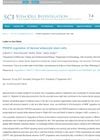 4 citations,
March 2013 in “The American Journal of Cosmetic Surgery”
4 citations,
March 2013 in “The American Journal of Cosmetic Surgery” Melanin absorbing light is necessary but not enough for effective hair removal by light treatment.
 June 2024 in “The American journal of psychiatry”
June 2024 in “The American journal of psychiatry” Schizophrenia risk genes may affect early brain development, contributing to the disease.
October 2021 in “The journal of investigative dermatology/Journal of investigative dermatology” Desmoglein 3 is important for keeping hair follicle stem cells inactive and maintaining their special properties.
February 2020 in “Journal of chemical neuroanatomy” Researchers found a way to make rat hair follicle cells start turning into motor neuron-like cells, but couldn't fully turn them into working motor neurons.
September 2022 in “Journal of Theoretical Biology” Hair follicles can regenerate after radiation damage but not during a specific growth phase.
January 2022 in “Stem cell biology and regenerative medicine” New hair can grow at wound sites, which could help improve treatments for hair loss and wound healing.
124 citations,
April 2000 in “Nature biotechnology”  58 citations,
August 2015 in “The Indonesian Biomedical Journal”
58 citations,
August 2015 in “The Indonesian Biomedical Journal” Different types of stem cells help maintain and heal skin.
 16 citations,
July 2023 in “Acta biomaterialia”
16 citations,
July 2023 in “Acta biomaterialia” The study developed a new way to create hair-growing tissue that can help regenerate hair follicles and control hair growth direction.
15 citations,
January 2015 in “Skin Appendage Disorders” Increased scalp sweating in frontal fibrosing alopecia may be linked to local skin inflammation.
 4 citations,
May 2012 in “Journal of Investigative Dermatology”
4 citations,
May 2012 in “Journal of Investigative Dermatology” The symposium concluded that a specific lipid might cause hair loss, inflammation is a key factor, and stem cells in bald scalps aren't working right, suggesting new treatment targets.
3 citations,
April 2020 in “Medicine” Acupuncture may be a safe and cost-effective treatment for Seborrheic alopecia.
 3 citations,
September 2017 in “Stem cell investigation”
3 citations,
September 2017 in “Stem cell investigation” PDGF signaling is crucial for maintaining fat stem cells in the skin, and its level of activation can either preserve these cells or cause fibrosis.
3 citations,
May 2013 in “International journal of molecular sciences” Epidermal stem cells show promise for treating orthopedic injuries and diseases.
 2 citations,
July 2022 in “Cell Regeneration”
2 citations,
July 2022 in “Cell Regeneration” Understanding hair growth involves complex factors, and more research is needed to improve treatments for hair loss conditions.
 1 citations,
August 2023 in “Journal of the American Academy of Dermatology”
1 citations,
August 2023 in “Journal of the American Academy of Dermatology” The guide helps dermatologists diagnose and treat different types of hair loss.
1 citations,
August 2021 in “International Journal of General Medicine” Severe and early hair loss may indicate a higher risk of heart disease.
 1 citations,
January 2021 in “Journal of Cancer Therapy”
1 citations,
January 2021 in “Journal of Cancer Therapy” Regenerative medicine may help reduce radiotherapy side effects like skin cancer, fibrosis, pain, and hair loss.
 1 citations,
January 2019 in “Journal of Dermatology and Dermatologic Surgery”
1 citations,
January 2019 in “Journal of Dermatology and Dermatologic Surgery” Stem cell therapy shows promise for hair loss treatment, but more research is needed to confirm its effectiveness.
1 citations,
December 2013 in “The journal of investigative dermatology. Symposium proceedings/The Journal of investigative dermatology symposium proceedings” New treatments and strategies are needed for Alopecia Areata, focusing on immune response and better trial designs.
 April 2024 in “Vestnik dermatologii i venerologii”
April 2024 in “Vestnik dermatologii i venerologii” Exosomes show promise for diagnosing and treating skin conditions and hair loss.
 February 2024 in “Drug Delivery and Translational Research”
February 2024 in “Drug Delivery and Translational Research” A new liposomal formulation improves drug delivery and hair growth for treating hair loss without causing skin irritation.
 January 2024 in “Pharmacy information”
January 2024 in “Pharmacy information” New treatments using stem cells and other methods show promise for promoting hair growth in androgenetic alopecia.
 September 2022 in “International Journal of Health Sciences (IJHS)”
September 2022 in “International Journal of Health Sciences (IJHS)” Low zinc levels may contribute to hair loss due to increased oxidative DNA damage.
January 2022 in “Springer eBooks” Fibroblast growth factors are crucial for hair follicle development and regeneration.
 20 citations,
May 2016 in “Journal of Cosmetic Dermatology”
20 citations,
May 2016 in “Journal of Cosmetic Dermatology” Low vitamin D receptor levels found in hair loss patients; topical vitamin D treatment suggested.
15 citations,
January 2019 in “Breast care” Preventive measures and effective management are crucial for reducing skin side effects in cancer treatment.
 125 citations,
September 2001 in “The FASEB Journal”
125 citations,
September 2001 in “The FASEB Journal” Stress can cause hair loss by negatively affecting hair follicles and this effect might be reversed with specific treatments.
 30 citations,
September 2003 in “Experimental Dermatology”
30 citations,
September 2003 in “Experimental Dermatology” Minoxidil helps prevent stress-caused hair loss in mice.
 127 citations,
December 2005 in “Experimental Dermatology”
127 citations,
December 2005 in “Experimental Dermatology” Stress can stop hair growth in mice, and treatments can reverse this effect.


















